Analysis of Legislations and Ethics in the Travel and Tourism Sector
VerifiedAdded on 2020/10/05
|12
|3991
|383
Report
AI Summary
This report provides a comprehensive analysis of the legal and ethical frameworks within the travel and tourism sector. It begins by explaining the legal and regulatory framework, including the Tourism Act 1969 and various consumer protection laws. The report then discusses surface, sea, and air transport laws, focusing on passenger rights and regulations. It evaluates the impact of health, safety, and security legislations, as well as equality legislation, on the industry. The report further explores contract and customer protection legislations, highlighting the importance of contracts and the rights of customers. Finally, it examines ethical dilemmas faced by the sector and analyzes corporate Social Responsibility (CSR) policies. The report covers key legislations like the Consumer Protection from Unfair Trading Act 2008, Health and Safety legislation, the Licensing Act 2003, and the Package travel regulations. It also highlights the role of various governing bodies such as HSE, CAA, and the Health and Safety Commission. The report emphasizes the importance of equality, discussing acts like the Racial Discrimination Act 1956, Human Rights Act 1998, and the Disability Discrimination Act, among others. The report concludes with a summary of the key findings and a discussion of the implications of these legal and ethical considerations for the travel and tourism sector. This document is available on Desklib, a platform offering AI-based study tools and resources.
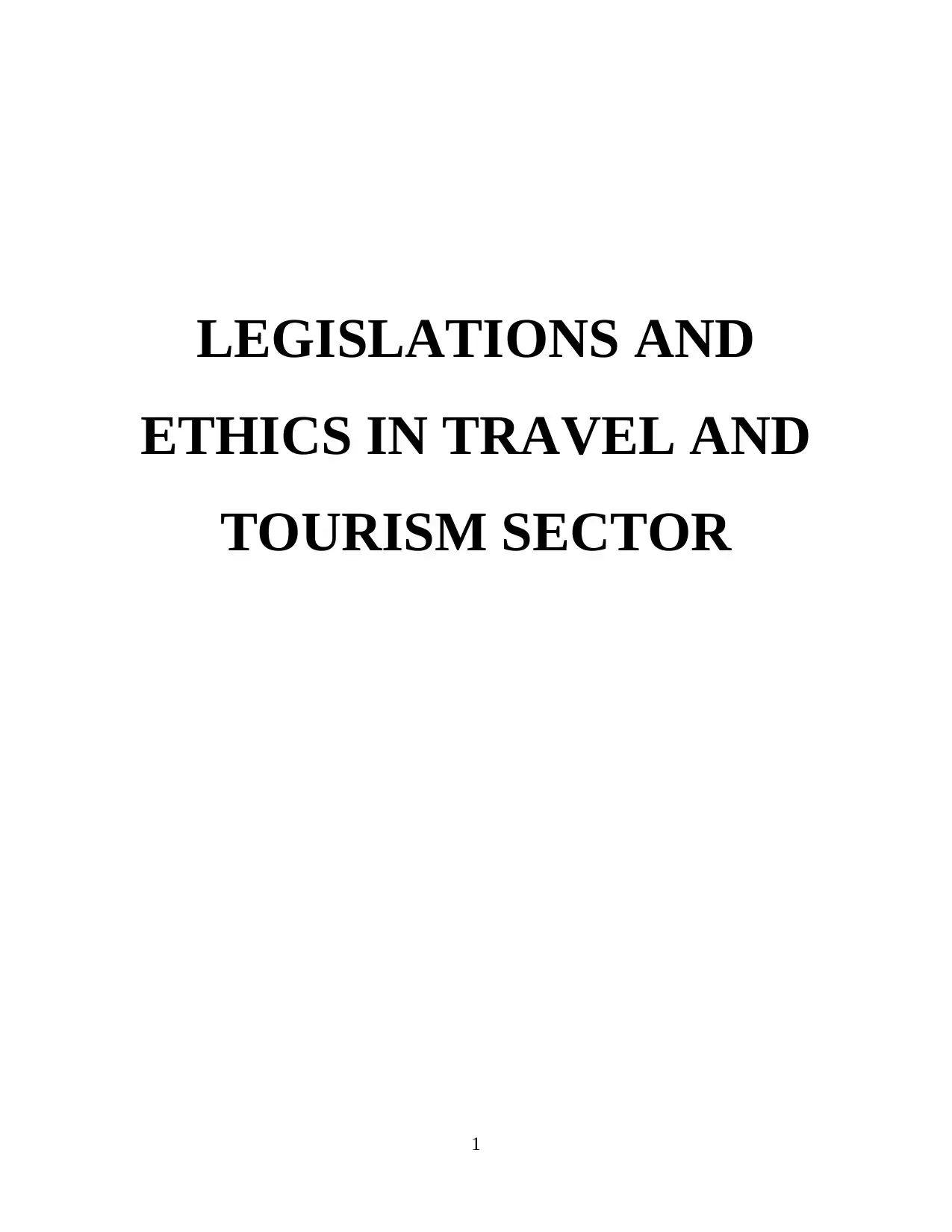
LEGISLATIONS AND
ETHICS IN TRAVEL AND
TOURISM SECTOR
1
ETHICS IN TRAVEL AND
TOURISM SECTOR
1
Paraphrase This Document
Need a fresh take? Get an instant paraphrase of this document with our AI Paraphraser
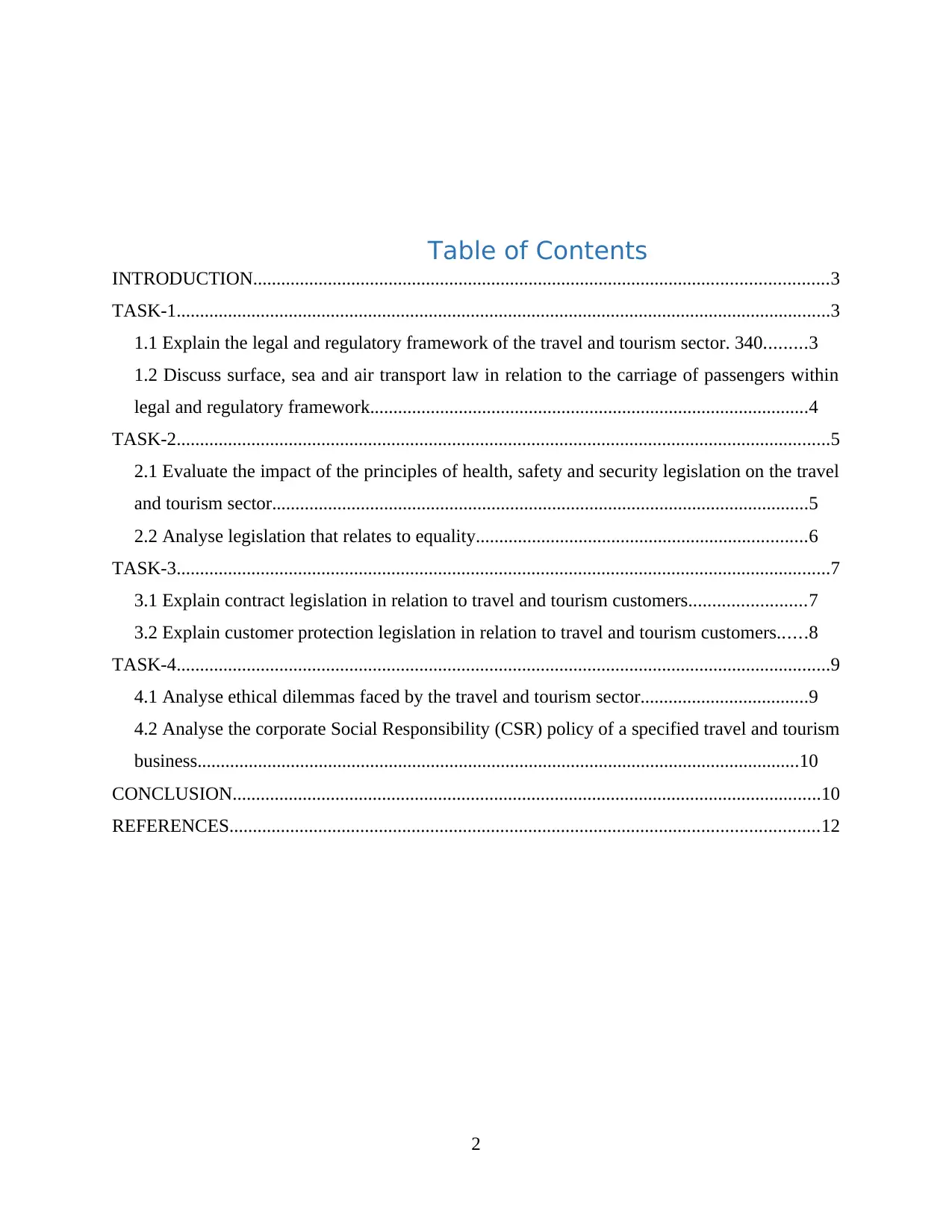
Table of Contents
INTRODUCTION...........................................................................................................................3
TASK-1............................................................................................................................................3
1.1 Explain the legal and regulatory framework of the travel and tourism sector. 340.........3
1.2 Discuss surface, sea and air transport law in relation to the carriage of passengers within
legal and regulatory framework..............................................................................................4
TASK-2............................................................................................................................................5
2.1 Evaluate the impact of the principles of health, safety and security legislation on the travel
and tourism sector...................................................................................................................5
2.2 Analyse legislation that relates to equality.......................................................................6
TASK-3............................................................................................................................................7
3.1 Explain contract legislation in relation to travel and tourism customers.........................7
3.2 Explain customer protection legislation in relation to travel and tourism customers......8
TASK-4............................................................................................................................................9
4.1 Analyse ethical dilemmas faced by the travel and tourism sector....................................9
4.2 Analyse the corporate Social Responsibility (CSR) policy of a specified travel and tourism
business.................................................................................................................................10
CONCLUSION..............................................................................................................................10
REFERENCES..............................................................................................................................12
2
INTRODUCTION...........................................................................................................................3
TASK-1............................................................................................................................................3
1.1 Explain the legal and regulatory framework of the travel and tourism sector. 340.........3
1.2 Discuss surface, sea and air transport law in relation to the carriage of passengers within
legal and regulatory framework..............................................................................................4
TASK-2............................................................................................................................................5
2.1 Evaluate the impact of the principles of health, safety and security legislation on the travel
and tourism sector...................................................................................................................5
2.2 Analyse legislation that relates to equality.......................................................................6
TASK-3............................................................................................................................................7
3.1 Explain contract legislation in relation to travel and tourism customers.........................7
3.2 Explain customer protection legislation in relation to travel and tourism customers......8
TASK-4............................................................................................................................................9
4.1 Analyse ethical dilemmas faced by the travel and tourism sector....................................9
4.2 Analyse the corporate Social Responsibility (CSR) policy of a specified travel and tourism
business.................................................................................................................................10
CONCLUSION..............................................................................................................................10
REFERENCES..............................................................................................................................12
2
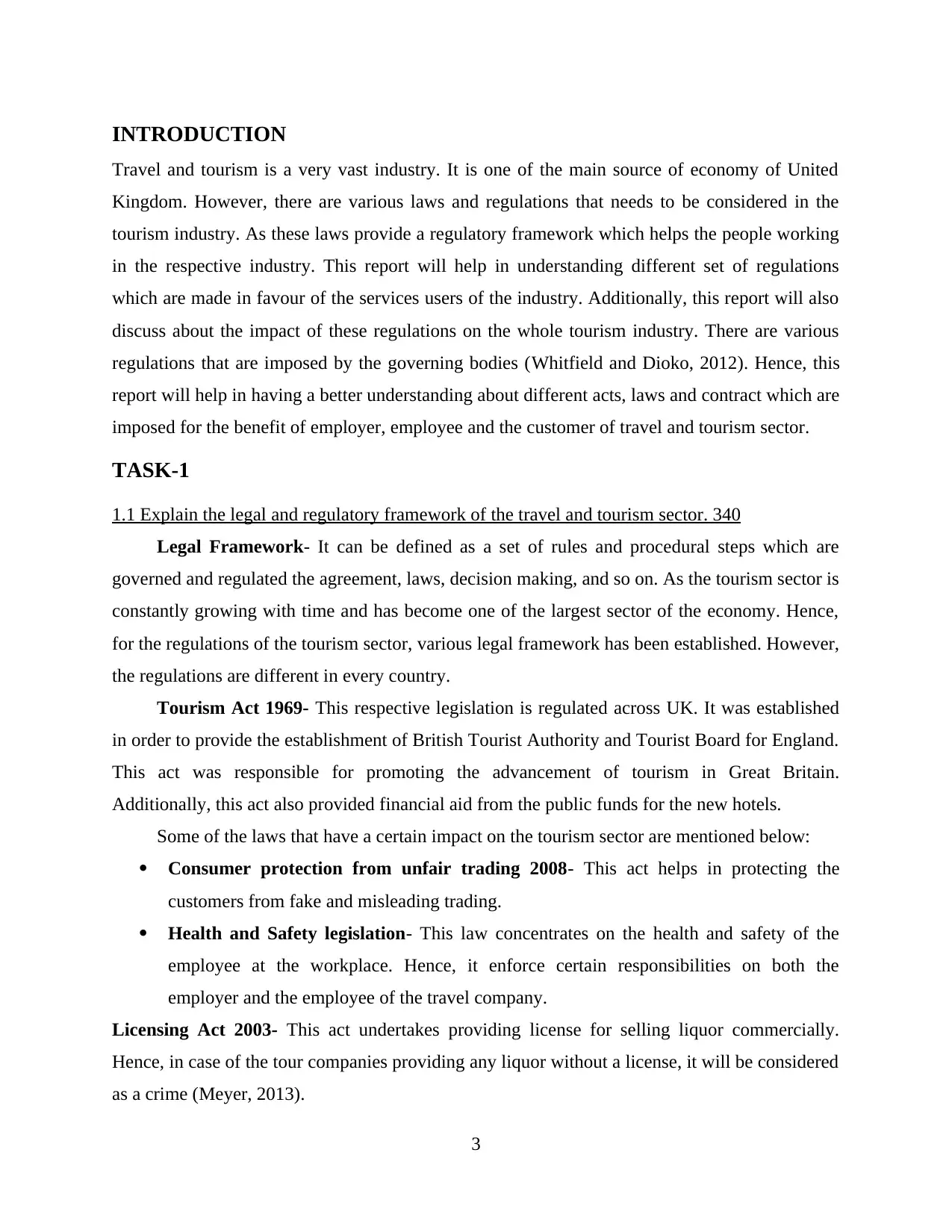
INTRODUCTION
Travel and tourism is a very vast industry. It is one of the main source of economy of United
Kingdom. However, there are various laws and regulations that needs to be considered in the
tourism industry. As these laws provide a regulatory framework which helps the people working
in the respective industry. This report will help in understanding different set of regulations
which are made in favour of the services users of the industry. Additionally, this report will also
discuss about the impact of these regulations on the whole tourism industry. There are various
regulations that are imposed by the governing bodies (Whitfield and Dioko, 2012). Hence, this
report will help in having a better understanding about different acts, laws and contract which are
imposed for the benefit of employer, employee and the customer of travel and tourism sector.
TASK-1
1.1 Explain the legal and regulatory framework of the travel and tourism sector. 340
Legal Framework- It can be defined as a set of rules and procedural steps which are
governed and regulated the agreement, laws, decision making, and so on. As the tourism sector is
constantly growing with time and has become one of the largest sector of the economy. Hence,
for the regulations of the tourism sector, various legal framework has been established. However,
the regulations are different in every country.
Tourism Act 1969- This respective legislation is regulated across UK. It was established
in order to provide the establishment of British Tourist Authority and Tourist Board for England.
This act was responsible for promoting the advancement of tourism in Great Britain.
Additionally, this act also provided financial aid from the public funds for the new hotels.
Some of the laws that have a certain impact on the tourism sector are mentioned below:
Consumer protection from unfair trading 2008- This act helps in protecting the
customers from fake and misleading trading.
Health and Safety legislation- This law concentrates on the health and safety of the
employee at the workplace. Hence, it enforce certain responsibilities on both the
employer and the employee of the travel company.
Licensing Act 2003- This act undertakes providing license for selling liquor commercially.
Hence, in case of the tour companies providing any liquor without a license, it will be considered
as a crime (Meyer, 2013).
3
Travel and tourism is a very vast industry. It is one of the main source of economy of United
Kingdom. However, there are various laws and regulations that needs to be considered in the
tourism industry. As these laws provide a regulatory framework which helps the people working
in the respective industry. This report will help in understanding different set of regulations
which are made in favour of the services users of the industry. Additionally, this report will also
discuss about the impact of these regulations on the whole tourism industry. There are various
regulations that are imposed by the governing bodies (Whitfield and Dioko, 2012). Hence, this
report will help in having a better understanding about different acts, laws and contract which are
imposed for the benefit of employer, employee and the customer of travel and tourism sector.
TASK-1
1.1 Explain the legal and regulatory framework of the travel and tourism sector. 340
Legal Framework- It can be defined as a set of rules and procedural steps which are
governed and regulated the agreement, laws, decision making, and so on. As the tourism sector is
constantly growing with time and has become one of the largest sector of the economy. Hence,
for the regulations of the tourism sector, various legal framework has been established. However,
the regulations are different in every country.
Tourism Act 1969- This respective legislation is regulated across UK. It was established
in order to provide the establishment of British Tourist Authority and Tourist Board for England.
This act was responsible for promoting the advancement of tourism in Great Britain.
Additionally, this act also provided financial aid from the public funds for the new hotels.
Some of the laws that have a certain impact on the tourism sector are mentioned below:
Consumer protection from unfair trading 2008- This act helps in protecting the
customers from fake and misleading trading.
Health and Safety legislation- This law concentrates on the health and safety of the
employee at the workplace. Hence, it enforce certain responsibilities on both the
employer and the employee of the travel company.
Licensing Act 2003- This act undertakes providing license for selling liquor commercially.
Hence, in case of the tour companies providing any liquor without a license, it will be considered
as a crime (Meyer, 2013).
3
⊘ This is a preview!⊘
Do you want full access?
Subscribe today to unlock all pages.

Trusted by 1+ million students worldwide
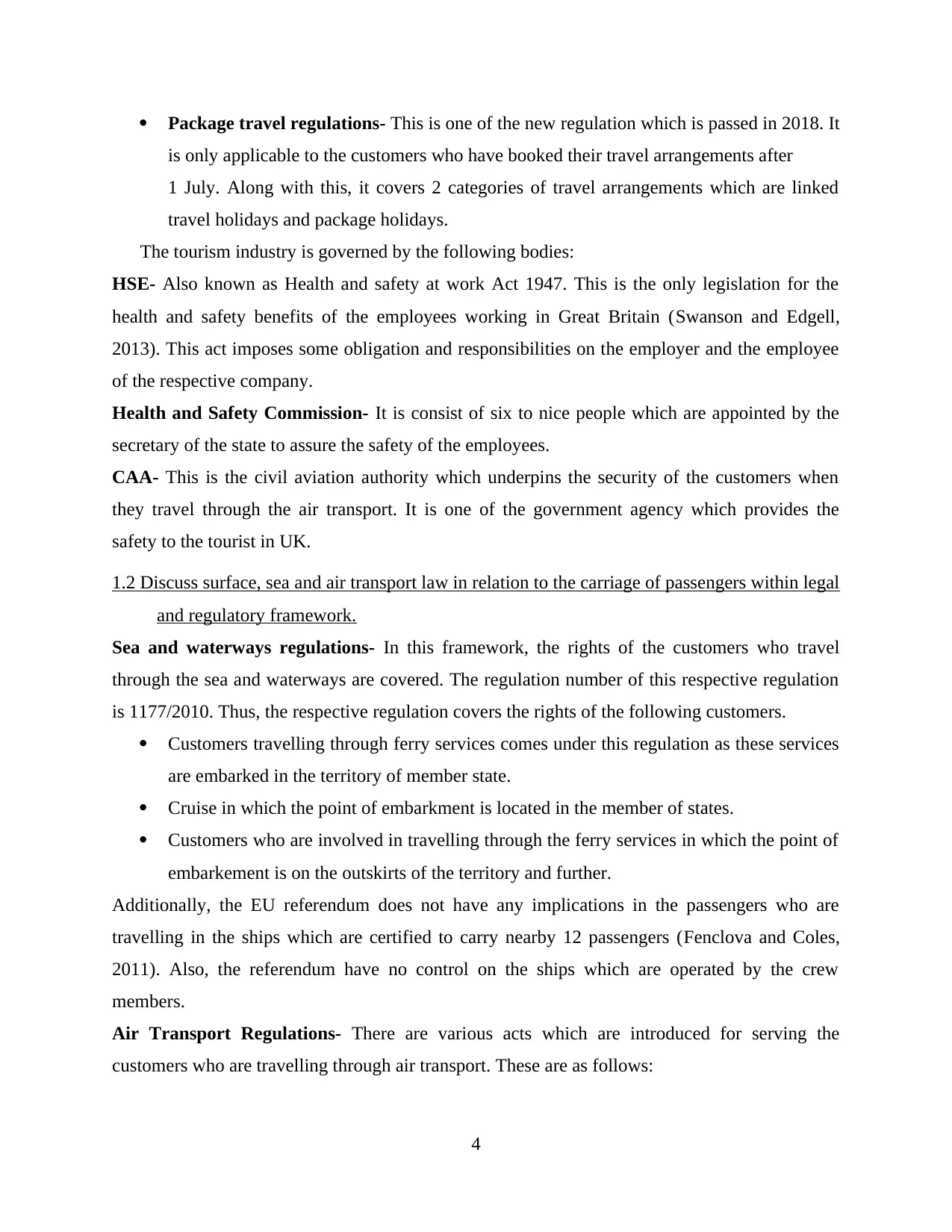
Package travel regulations- This is one of the new regulation which is passed in 2018. It
is only applicable to the customers who have booked their travel arrangements after
1 July. Along with this, it covers 2 categories of travel arrangements which are linked
travel holidays and package holidays.
The tourism industry is governed by the following bodies:
HSE- Also known as Health and safety at work Act 1947. This is the only legislation for the
health and safety benefits of the employees working in Great Britain (Swanson and Edgell,
2013). This act imposes some obligation and responsibilities on the employer and the employee
of the respective company.
Health and Safety Commission- It is consist of six to nice people which are appointed by the
secretary of the state to assure the safety of the employees.
CAA- This is the civil aviation authority which underpins the security of the customers when
they travel through the air transport. It is one of the government agency which provides the
safety to the tourist in UK.
1.2 Discuss surface, sea and air transport law in relation to the carriage of passengers within legal
and regulatory framework.
Sea and waterways regulations- In this framework, the rights of the customers who travel
through the sea and waterways are covered. The regulation number of this respective regulation
is 1177/2010. Thus, the respective regulation covers the rights of the following customers.
Customers travelling through ferry services comes under this regulation as these services
are embarked in the territory of member state.
Cruise in which the point of embarkment is located in the member of states.
Customers who are involved in travelling through the ferry services in which the point of
embarkement is on the outskirts of the territory and further.
Additionally, the EU referendum does not have any implications in the passengers who are
travelling in the ships which are certified to carry nearby 12 passengers (Fenclova and Coles,
2011). Also, the referendum have no control on the ships which are operated by the crew
members.
Air Transport Regulations- There are various acts which are introduced for serving the
customers who are travelling through air transport. These are as follows:
4
is only applicable to the customers who have booked their travel arrangements after
1 July. Along with this, it covers 2 categories of travel arrangements which are linked
travel holidays and package holidays.
The tourism industry is governed by the following bodies:
HSE- Also known as Health and safety at work Act 1947. This is the only legislation for the
health and safety benefits of the employees working in Great Britain (Swanson and Edgell,
2013). This act imposes some obligation and responsibilities on the employer and the employee
of the respective company.
Health and Safety Commission- It is consist of six to nice people which are appointed by the
secretary of the state to assure the safety of the employees.
CAA- This is the civil aviation authority which underpins the security of the customers when
they travel through the air transport. It is one of the government agency which provides the
safety to the tourist in UK.
1.2 Discuss surface, sea and air transport law in relation to the carriage of passengers within legal
and regulatory framework.
Sea and waterways regulations- In this framework, the rights of the customers who travel
through the sea and waterways are covered. The regulation number of this respective regulation
is 1177/2010. Thus, the respective regulation covers the rights of the following customers.
Customers travelling through ferry services comes under this regulation as these services
are embarked in the territory of member state.
Cruise in which the point of embarkment is located in the member of states.
Customers who are involved in travelling through the ferry services in which the point of
embarkement is on the outskirts of the territory and further.
Additionally, the EU referendum does not have any implications in the passengers who are
travelling in the ships which are certified to carry nearby 12 passengers (Fenclova and Coles,
2011). Also, the referendum have no control on the ships which are operated by the crew
members.
Air Transport Regulations- There are various acts which are introduced for serving the
customers who are travelling through air transport. These are as follows:
4
Paraphrase This Document
Need a fresh take? Get an instant paraphrase of this document with our AI Paraphraser
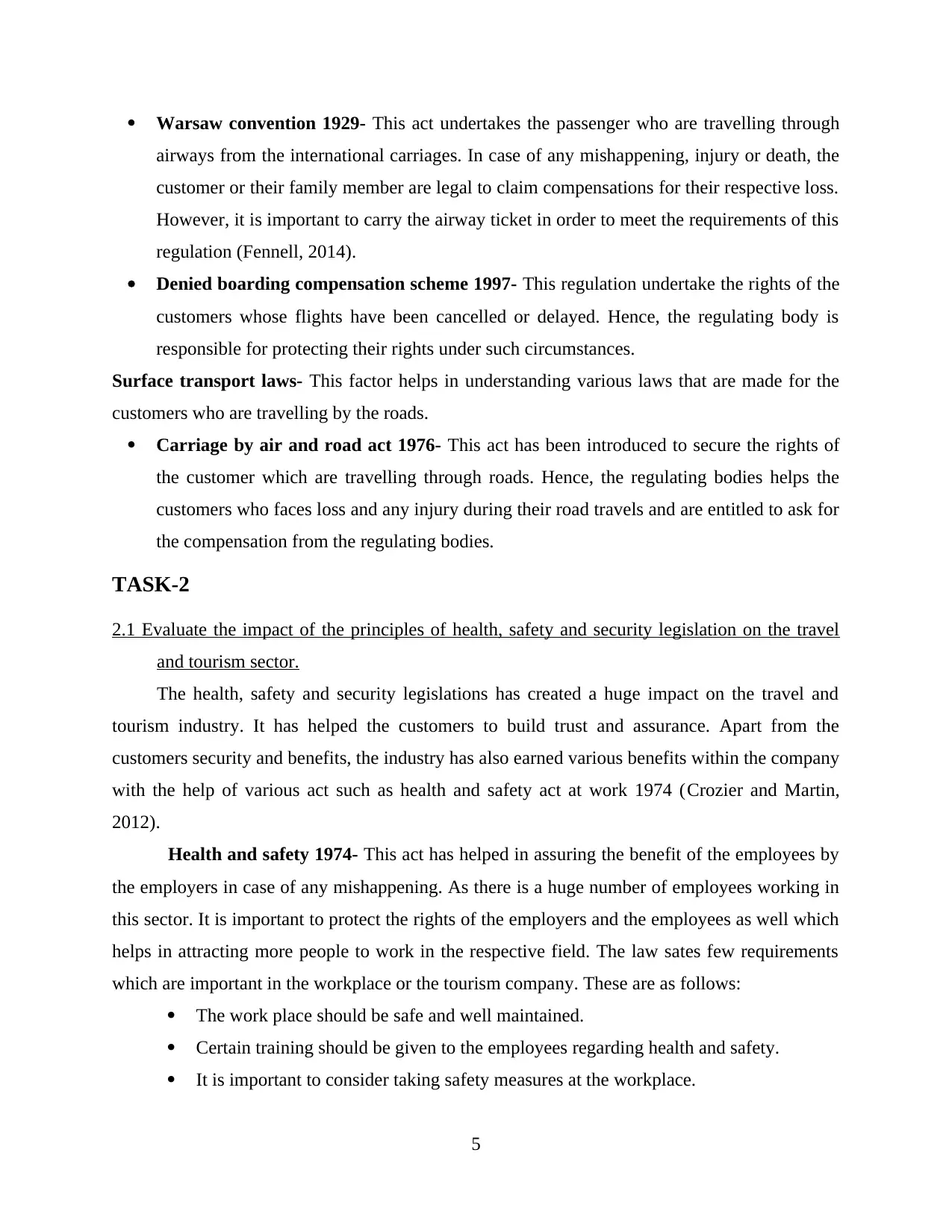
Warsaw convention 1929- This act undertakes the passenger who are travelling through
airways from the international carriages. In case of any mishappening, injury or death, the
customer or their family member are legal to claim compensations for their respective loss.
However, it is important to carry the airway ticket in order to meet the requirements of this
regulation (Fennell, 2014).
Denied boarding compensation scheme 1997- This regulation undertake the rights of the
customers whose flights have been cancelled or delayed. Hence, the regulating body is
responsible for protecting their rights under such circumstances.
Surface transport laws- This factor helps in understanding various laws that are made for the
customers who are travelling by the roads.
Carriage by air and road act 1976- This act has been introduced to secure the rights of
the customer which are travelling through roads. Hence, the regulating bodies helps the
customers who faces loss and any injury during their road travels and are entitled to ask for
the compensation from the regulating bodies.
TASK-2
2.1 Evaluate the impact of the principles of health, safety and security legislation on the travel
and tourism sector.
The health, safety and security legislations has created a huge impact on the travel and
tourism industry. It has helped the customers to build trust and assurance. Apart from the
customers security and benefits, the industry has also earned various benefits within the company
with the help of various act such as health and safety act at work 1974 (Crozier and Martin,
2012).
Health and safety 1974- This act has helped in assuring the benefit of the employees by
the employers in case of any mishappening. As there is a huge number of employees working in
this sector. It is important to protect the rights of the employers and the employees as well which
helps in attracting more people to work in the respective field. The law sates few requirements
which are important in the workplace or the tourism company. These are as follows:
The work place should be safe and well maintained.
Certain training should be given to the employees regarding health and safety.
It is important to consider taking safety measures at the workplace.
5
airways from the international carriages. In case of any mishappening, injury or death, the
customer or their family member are legal to claim compensations for their respective loss.
However, it is important to carry the airway ticket in order to meet the requirements of this
regulation (Fennell, 2014).
Denied boarding compensation scheme 1997- This regulation undertake the rights of the
customers whose flights have been cancelled or delayed. Hence, the regulating body is
responsible for protecting their rights under such circumstances.
Surface transport laws- This factor helps in understanding various laws that are made for the
customers who are travelling by the roads.
Carriage by air and road act 1976- This act has been introduced to secure the rights of
the customer which are travelling through roads. Hence, the regulating bodies helps the
customers who faces loss and any injury during their road travels and are entitled to ask for
the compensation from the regulating bodies.
TASK-2
2.1 Evaluate the impact of the principles of health, safety and security legislation on the travel
and tourism sector.
The health, safety and security legislations has created a huge impact on the travel and
tourism industry. It has helped the customers to build trust and assurance. Apart from the
customers security and benefits, the industry has also earned various benefits within the company
with the help of various act such as health and safety act at work 1974 (Crozier and Martin,
2012).
Health and safety 1974- This act has helped in assuring the benefit of the employees by
the employers in case of any mishappening. As there is a huge number of employees working in
this sector. It is important to protect the rights of the employers and the employees as well which
helps in attracting more people to work in the respective field. The law sates few requirements
which are important in the workplace or the tourism company. These are as follows:
The work place should be safe and well maintained.
Certain training should be given to the employees regarding health and safety.
It is important to consider taking safety measures at the workplace.
5
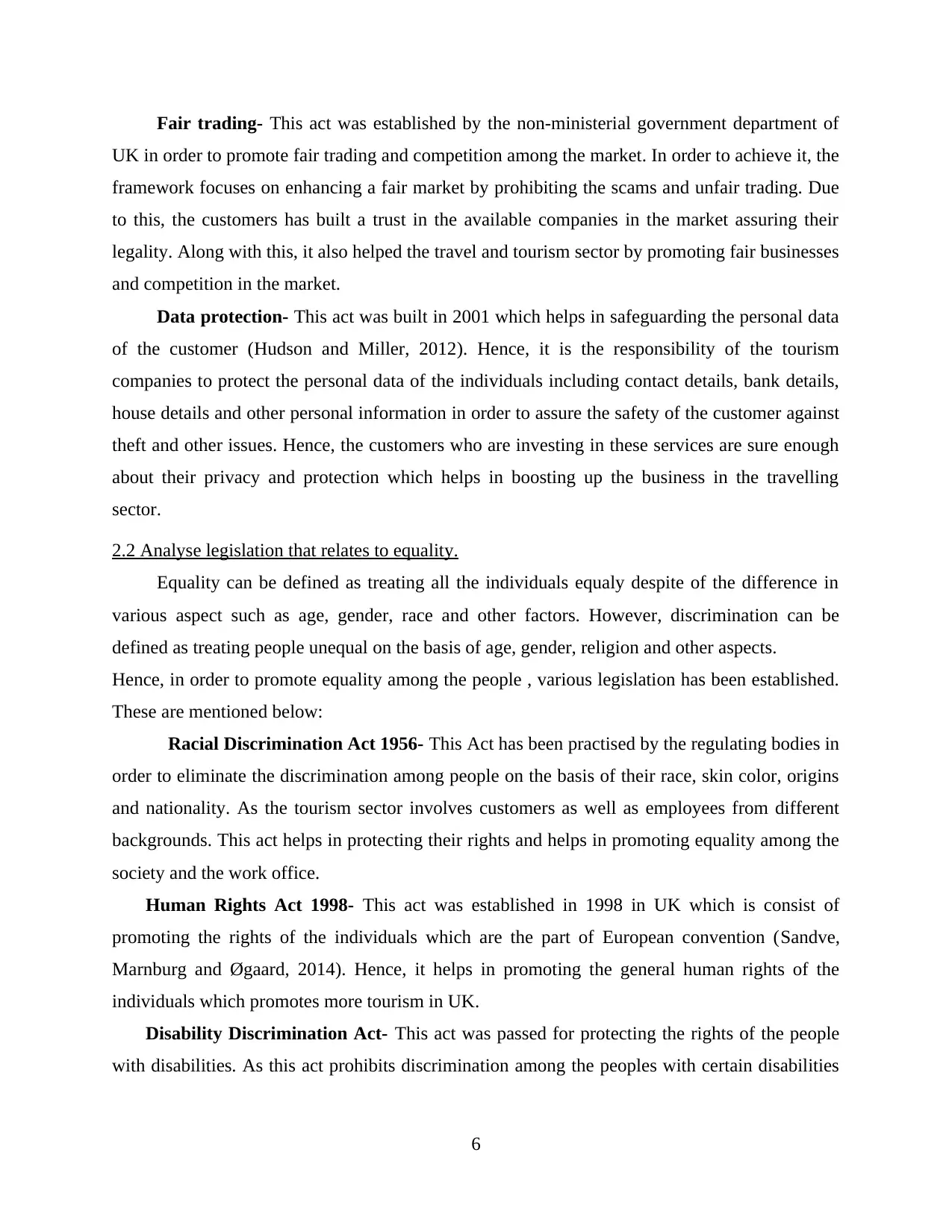
Fair trading- This act was established by the non-ministerial government department of
UK in order to promote fair trading and competition among the market. In order to achieve it, the
framework focuses on enhancing a fair market by prohibiting the scams and unfair trading. Due
to this, the customers has built a trust in the available companies in the market assuring their
legality. Along with this, it also helped the travel and tourism sector by promoting fair businesses
and competition in the market.
Data protection- This act was built in 2001 which helps in safeguarding the personal data
of the customer (Hudson and Miller, 2012). Hence, it is the responsibility of the tourism
companies to protect the personal data of the individuals including contact details, bank details,
house details and other personal information in order to assure the safety of the customer against
theft and other issues. Hence, the customers who are investing in these services are sure enough
about their privacy and protection which helps in boosting up the business in the travelling
sector.
2.2 Analyse legislation that relates to equality.
Equality can be defined as treating all the individuals equaly despite of the difference in
various aspect such as age, gender, race and other factors. However, discrimination can be
defined as treating people unequal on the basis of age, gender, religion and other aspects.
Hence, in order to promote equality among the people , various legislation has been established.
These are mentioned below:
Racial Discrimination Act 1956- This Act has been practised by the regulating bodies in
order to eliminate the discrimination among people on the basis of their race, skin color, origins
and nationality. As the tourism sector involves customers as well as employees from different
backgrounds. This act helps in protecting their rights and helps in promoting equality among the
society and the work office.
Human Rights Act 1998- This act was established in 1998 in UK which is consist of
promoting the rights of the individuals which are the part of European convention (Sandve,
Marnburg and Øgaard, 2014). Hence, it helps in promoting the general human rights of the
individuals which promotes more tourism in UK.
Disability Discrimination Act- This act was passed for protecting the rights of the people
with disabilities. As this act prohibits discrimination among the peoples with certain disabilities
6
UK in order to promote fair trading and competition among the market. In order to achieve it, the
framework focuses on enhancing a fair market by prohibiting the scams and unfair trading. Due
to this, the customers has built a trust in the available companies in the market assuring their
legality. Along with this, it also helped the travel and tourism sector by promoting fair businesses
and competition in the market.
Data protection- This act was built in 2001 which helps in safeguarding the personal data
of the customer (Hudson and Miller, 2012). Hence, it is the responsibility of the tourism
companies to protect the personal data of the individuals including contact details, bank details,
house details and other personal information in order to assure the safety of the customer against
theft and other issues. Hence, the customers who are investing in these services are sure enough
about their privacy and protection which helps in boosting up the business in the travelling
sector.
2.2 Analyse legislation that relates to equality.
Equality can be defined as treating all the individuals equaly despite of the difference in
various aspect such as age, gender, race and other factors. However, discrimination can be
defined as treating people unequal on the basis of age, gender, religion and other aspects.
Hence, in order to promote equality among the people , various legislation has been established.
These are mentioned below:
Racial Discrimination Act 1956- This Act has been practised by the regulating bodies in
order to eliminate the discrimination among people on the basis of their race, skin color, origins
and nationality. As the tourism sector involves customers as well as employees from different
backgrounds. This act helps in protecting their rights and helps in promoting equality among the
society and the work office.
Human Rights Act 1998- This act was established in 1998 in UK which is consist of
promoting the rights of the individuals which are the part of European convention (Sandve,
Marnburg and Øgaard, 2014). Hence, it helps in promoting the general human rights of the
individuals which promotes more tourism in UK.
Disability Discrimination Act- This act was passed for protecting the rights of the people
with disabilities. As this act prohibits discrimination among the peoples with certain disabilities
6
⊘ This is a preview!⊘
Do you want full access?
Subscribe today to unlock all pages.

Trusted by 1+ million students worldwide
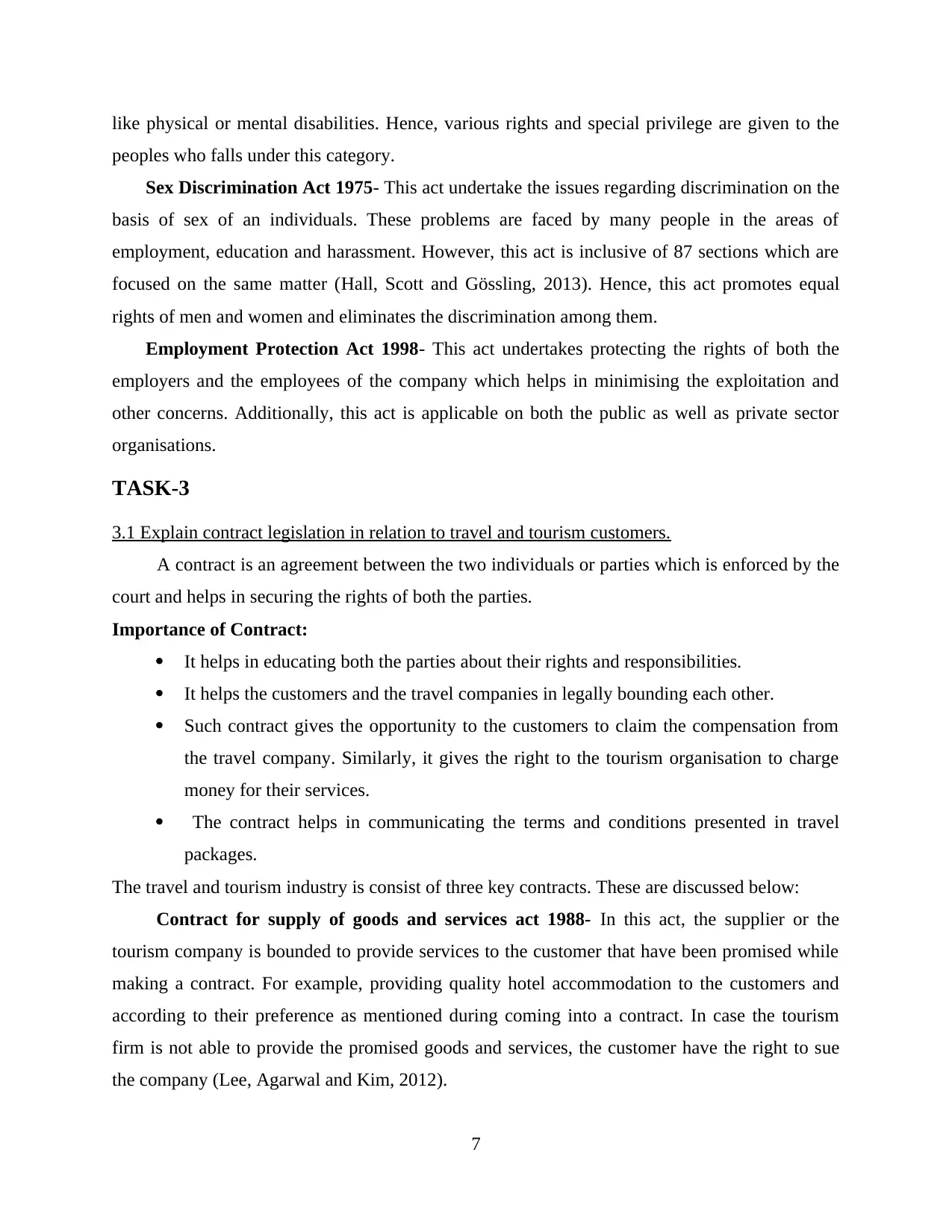
like physical or mental disabilities. Hence, various rights and special privilege are given to the
peoples who falls under this category.
Sex Discrimination Act 1975- This act undertake the issues regarding discrimination on the
basis of sex of an individuals. These problems are faced by many people in the areas of
employment, education and harassment. However, this act is inclusive of 87 sections which are
focused on the same matter (Hall, Scott and Gössling, 2013). Hence, this act promotes equal
rights of men and women and eliminates the discrimination among them.
Employment Protection Act 1998- This act undertakes protecting the rights of both the
employers and the employees of the company which helps in minimising the exploitation and
other concerns. Additionally, this act is applicable on both the public as well as private sector
organisations.
TASK-3
3.1 Explain contract legislation in relation to travel and tourism customers.
A contract is an agreement between the two individuals or parties which is enforced by the
court and helps in securing the rights of both the parties.
Importance of Contract:
It helps in educating both the parties about their rights and responsibilities.
It helps the customers and the travel companies in legally bounding each other.
Such contract gives the opportunity to the customers to claim the compensation from
the travel company. Similarly, it gives the right to the tourism organisation to charge
money for their services.
The contract helps in communicating the terms and conditions presented in travel
packages.
The travel and tourism industry is consist of three key contracts. These are discussed below:
Contract for supply of goods and services act 1988- In this act, the supplier or the
tourism company is bounded to provide services to the customer that have been promised while
making a contract. For example, providing quality hotel accommodation to the customers and
according to their preference as mentioned during coming into a contract. In case the tourism
firm is not able to provide the promised goods and services, the customer have the right to sue
the company (Lee, Agarwal and Kim, 2012).
7
peoples who falls under this category.
Sex Discrimination Act 1975- This act undertake the issues regarding discrimination on the
basis of sex of an individuals. These problems are faced by many people in the areas of
employment, education and harassment. However, this act is inclusive of 87 sections which are
focused on the same matter (Hall, Scott and Gössling, 2013). Hence, this act promotes equal
rights of men and women and eliminates the discrimination among them.
Employment Protection Act 1998- This act undertakes protecting the rights of both the
employers and the employees of the company which helps in minimising the exploitation and
other concerns. Additionally, this act is applicable on both the public as well as private sector
organisations.
TASK-3
3.1 Explain contract legislation in relation to travel and tourism customers.
A contract is an agreement between the two individuals or parties which is enforced by the
court and helps in securing the rights of both the parties.
Importance of Contract:
It helps in educating both the parties about their rights and responsibilities.
It helps the customers and the travel companies in legally bounding each other.
Such contract gives the opportunity to the customers to claim the compensation from
the travel company. Similarly, it gives the right to the tourism organisation to charge
money for their services.
The contract helps in communicating the terms and conditions presented in travel
packages.
The travel and tourism industry is consist of three key contracts. These are discussed below:
Contract for supply of goods and services act 1988- In this act, the supplier or the
tourism company is bounded to provide services to the customer that have been promised while
making a contract. For example, providing quality hotel accommodation to the customers and
according to their preference as mentioned during coming into a contract. In case the tourism
firm is not able to provide the promised goods and services, the customer have the right to sue
the company (Lee, Agarwal and Kim, 2012).
7
Paraphrase This Document
Need a fresh take? Get an instant paraphrase of this document with our AI Paraphraser
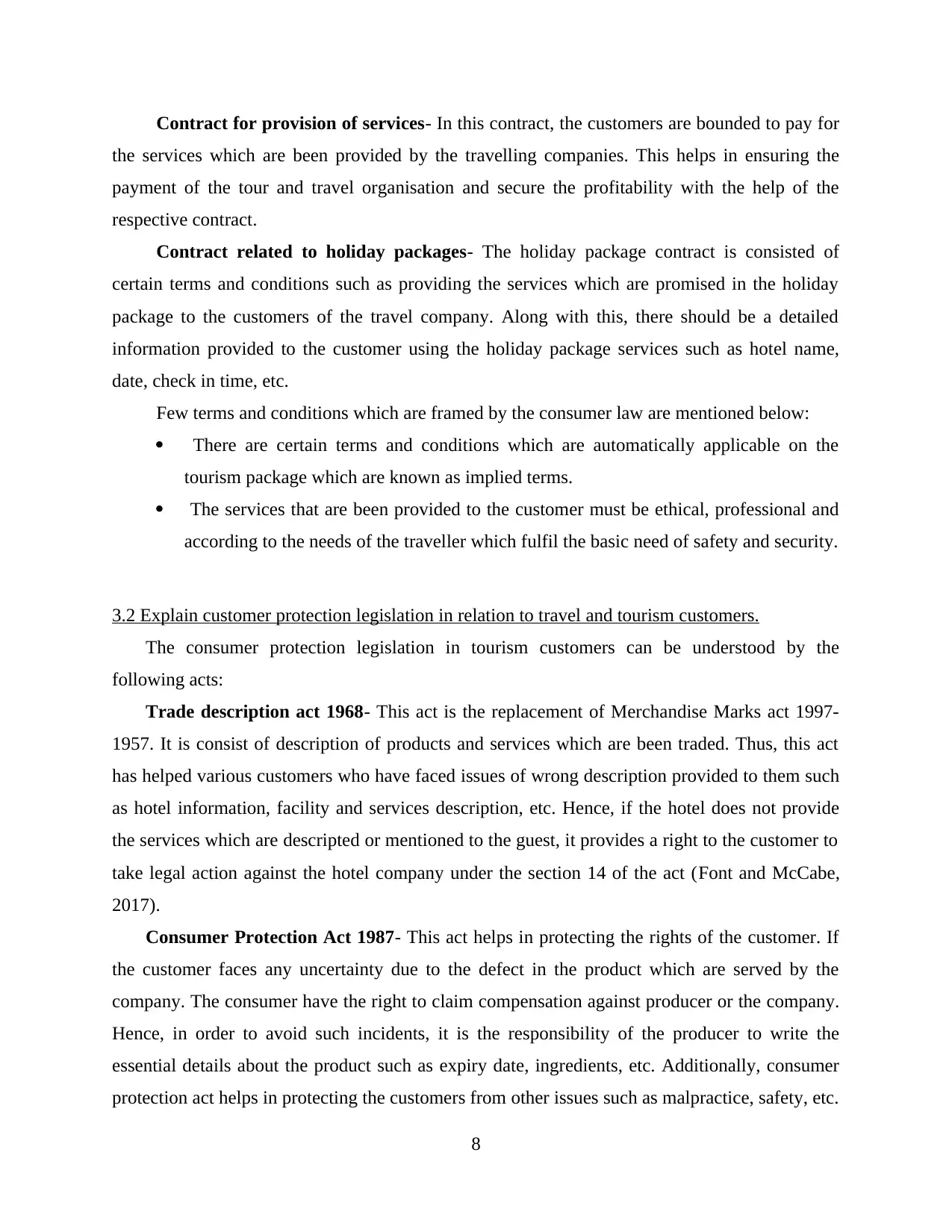
Contract for provision of services- In this contract, the customers are bounded to pay for
the services which are been provided by the travelling companies. This helps in ensuring the
payment of the tour and travel organisation and secure the profitability with the help of the
respective contract.
Contract related to holiday packages- The holiday package contract is consisted of
certain terms and conditions such as providing the services which are promised in the holiday
package to the customers of the travel company. Along with this, there should be a detailed
information provided to the customer using the holiday package services such as hotel name,
date, check in time, etc.
Few terms and conditions which are framed by the consumer law are mentioned below:
There are certain terms and conditions which are automatically applicable on the
tourism package which are known as implied terms.
The services that are been provided to the customer must be ethical, professional and
according to the needs of the traveller which fulfil the basic need of safety and security.
3.2 Explain customer protection legislation in relation to travel and tourism customers.
The consumer protection legislation in tourism customers can be understood by the
following acts:
Trade description act 1968- This act is the replacement of Merchandise Marks act 1997-
1957. It is consist of description of products and services which are been traded. Thus, this act
has helped various customers who have faced issues of wrong description provided to them such
as hotel information, facility and services description, etc. Hence, if the hotel does not provide
the services which are descripted or mentioned to the guest, it provides a right to the customer to
take legal action against the hotel company under the section 14 of the act (Font and McCabe,
2017).
Consumer Protection Act 1987- This act helps in protecting the rights of the customer. If
the customer faces any uncertainty due to the defect in the product which are served by the
company. The consumer have the right to claim compensation against producer or the company.
Hence, in order to avoid such incidents, it is the responsibility of the producer to write the
essential details about the product such as expiry date, ingredients, etc. Additionally, consumer
protection act helps in protecting the customers from other issues such as malpractice, safety, etc.
8
the services which are been provided by the travelling companies. This helps in ensuring the
payment of the tour and travel organisation and secure the profitability with the help of the
respective contract.
Contract related to holiday packages- The holiday package contract is consisted of
certain terms and conditions such as providing the services which are promised in the holiday
package to the customers of the travel company. Along with this, there should be a detailed
information provided to the customer using the holiday package services such as hotel name,
date, check in time, etc.
Few terms and conditions which are framed by the consumer law are mentioned below:
There are certain terms and conditions which are automatically applicable on the
tourism package which are known as implied terms.
The services that are been provided to the customer must be ethical, professional and
according to the needs of the traveller which fulfil the basic need of safety and security.
3.2 Explain customer protection legislation in relation to travel and tourism customers.
The consumer protection legislation in tourism customers can be understood by the
following acts:
Trade description act 1968- This act is the replacement of Merchandise Marks act 1997-
1957. It is consist of description of products and services which are been traded. Thus, this act
has helped various customers who have faced issues of wrong description provided to them such
as hotel information, facility and services description, etc. Hence, if the hotel does not provide
the services which are descripted or mentioned to the guest, it provides a right to the customer to
take legal action against the hotel company under the section 14 of the act (Font and McCabe,
2017).
Consumer Protection Act 1987- This act helps in protecting the rights of the customer. If
the customer faces any uncertainty due to the defect in the product which are served by the
company. The consumer have the right to claim compensation against producer or the company.
Hence, in order to avoid such incidents, it is the responsibility of the producer to write the
essential details about the product such as expiry date, ingredients, etc. Additionally, consumer
protection act helps in protecting the customers from other issues such as malpractice, safety, etc.
8
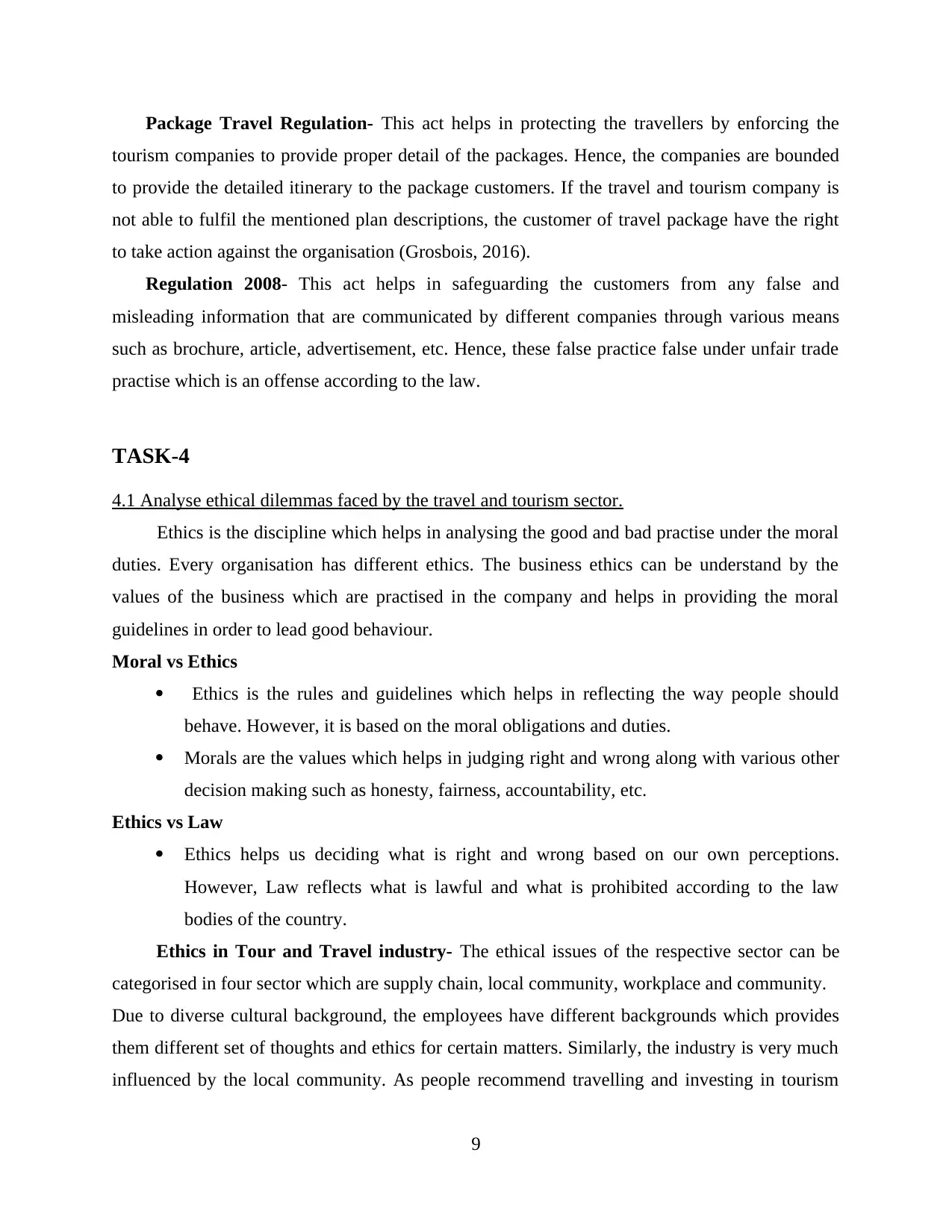
Package Travel Regulation- This act helps in protecting the travellers by enforcing the
tourism companies to provide proper detail of the packages. Hence, the companies are bounded
to provide the detailed itinerary to the package customers. If the travel and tourism company is
not able to fulfil the mentioned plan descriptions, the customer of travel package have the right
to take action against the organisation (Grosbois, 2016).
Regulation 2008- This act helps in safeguarding the customers from any false and
misleading information that are communicated by different companies through various means
such as brochure, article, advertisement, etc. Hence, these false practice false under unfair trade
practise which is an offense according to the law.
TASK-4
4.1 Analyse ethical dilemmas faced by the travel and tourism sector.
Ethics is the discipline which helps in analysing the good and bad practise under the moral
duties. Every organisation has different ethics. The business ethics can be understand by the
values of the business which are practised in the company and helps in providing the moral
guidelines in order to lead good behaviour.
Moral vs Ethics
Ethics is the rules and guidelines which helps in reflecting the way people should
behave. However, it is based on the moral obligations and duties.
Morals are the values which helps in judging right and wrong along with various other
decision making such as honesty, fairness, accountability, etc.
Ethics vs Law
Ethics helps us deciding what is right and wrong based on our own perceptions.
However, Law reflects what is lawful and what is prohibited according to the law
bodies of the country.
Ethics in Tour and Travel industry- The ethical issues of the respective sector can be
categorised in four sector which are supply chain, local community, workplace and community.
Due to diverse cultural background, the employees have different backgrounds which provides
them different set of thoughts and ethics for certain matters. Similarly, the industry is very much
influenced by the local community. As people recommend travelling and investing in tourism
9
tourism companies to provide proper detail of the packages. Hence, the companies are bounded
to provide the detailed itinerary to the package customers. If the travel and tourism company is
not able to fulfil the mentioned plan descriptions, the customer of travel package have the right
to take action against the organisation (Grosbois, 2016).
Regulation 2008- This act helps in safeguarding the customers from any false and
misleading information that are communicated by different companies through various means
such as brochure, article, advertisement, etc. Hence, these false practice false under unfair trade
practise which is an offense according to the law.
TASK-4
4.1 Analyse ethical dilemmas faced by the travel and tourism sector.
Ethics is the discipline which helps in analysing the good and bad practise under the moral
duties. Every organisation has different ethics. The business ethics can be understand by the
values of the business which are practised in the company and helps in providing the moral
guidelines in order to lead good behaviour.
Moral vs Ethics
Ethics is the rules and guidelines which helps in reflecting the way people should
behave. However, it is based on the moral obligations and duties.
Morals are the values which helps in judging right and wrong along with various other
decision making such as honesty, fairness, accountability, etc.
Ethics vs Law
Ethics helps us deciding what is right and wrong based on our own perceptions.
However, Law reflects what is lawful and what is prohibited according to the law
bodies of the country.
Ethics in Tour and Travel industry- The ethical issues of the respective sector can be
categorised in four sector which are supply chain, local community, workplace and community.
Due to diverse cultural background, the employees have different backgrounds which provides
them different set of thoughts and ethics for certain matters. Similarly, the industry is very much
influenced by the local community. As people recommend travelling and investing in tourism
9
⊘ This is a preview!⊘
Do you want full access?
Subscribe today to unlock all pages.

Trusted by 1+ million students worldwide
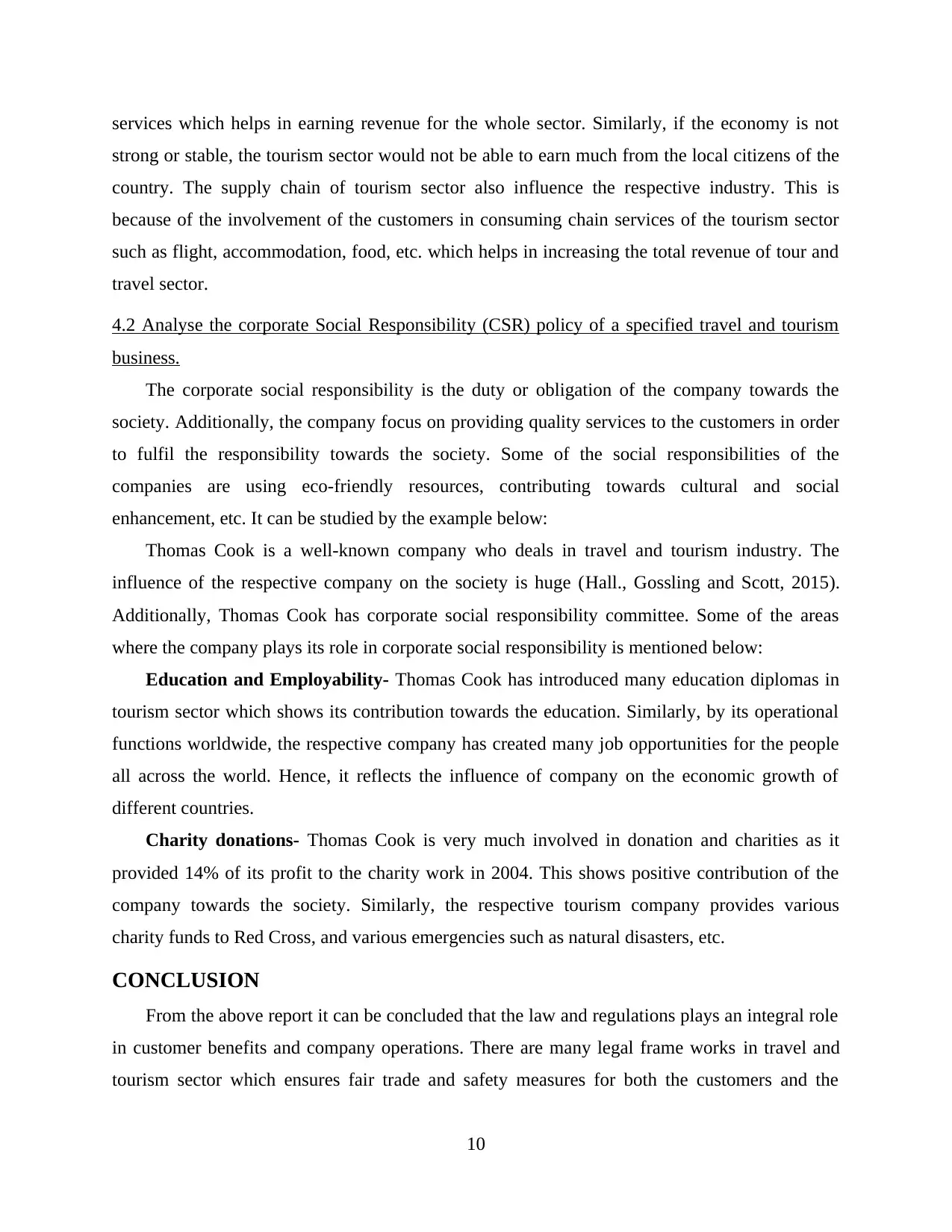
services which helps in earning revenue for the whole sector. Similarly, if the economy is not
strong or stable, the tourism sector would not be able to earn much from the local citizens of the
country. The supply chain of tourism sector also influence the respective industry. This is
because of the involvement of the customers in consuming chain services of the tourism sector
such as flight, accommodation, food, etc. which helps in increasing the total revenue of tour and
travel sector.
4.2 Analyse the corporate Social Responsibility (CSR) policy of a specified travel and tourism
business.
The corporate social responsibility is the duty or obligation of the company towards the
society. Additionally, the company focus on providing quality services to the customers in order
to fulfil the responsibility towards the society. Some of the social responsibilities of the
companies are using eco-friendly resources, contributing towards cultural and social
enhancement, etc. It can be studied by the example below:
Thomas Cook is a well-known company who deals in travel and tourism industry. The
influence of the respective company on the society is huge (Hall., Gossling and Scott, 2015).
Additionally, Thomas Cook has corporate social responsibility committee. Some of the areas
where the company plays its role in corporate social responsibility is mentioned below:
Education and Employability- Thomas Cook has introduced many education diplomas in
tourism sector which shows its contribution towards the education. Similarly, by its operational
functions worldwide, the respective company has created many job opportunities for the people
all across the world. Hence, it reflects the influence of company on the economic growth of
different countries.
Charity donations- Thomas Cook is very much involved in donation and charities as it
provided 14% of its profit to the charity work in 2004. This shows positive contribution of the
company towards the society. Similarly, the respective tourism company provides various
charity funds to Red Cross, and various emergencies such as natural disasters, etc.
CONCLUSION
From the above report it can be concluded that the law and regulations plays an integral role
in customer benefits and company operations. There are many legal frame works in travel and
tourism sector which ensures fair trade and safety measures for both the customers and the
10
strong or stable, the tourism sector would not be able to earn much from the local citizens of the
country. The supply chain of tourism sector also influence the respective industry. This is
because of the involvement of the customers in consuming chain services of the tourism sector
such as flight, accommodation, food, etc. which helps in increasing the total revenue of tour and
travel sector.
4.2 Analyse the corporate Social Responsibility (CSR) policy of a specified travel and tourism
business.
The corporate social responsibility is the duty or obligation of the company towards the
society. Additionally, the company focus on providing quality services to the customers in order
to fulfil the responsibility towards the society. Some of the social responsibilities of the
companies are using eco-friendly resources, contributing towards cultural and social
enhancement, etc. It can be studied by the example below:
Thomas Cook is a well-known company who deals in travel and tourism industry. The
influence of the respective company on the society is huge (Hall., Gossling and Scott, 2015).
Additionally, Thomas Cook has corporate social responsibility committee. Some of the areas
where the company plays its role in corporate social responsibility is mentioned below:
Education and Employability- Thomas Cook has introduced many education diplomas in
tourism sector which shows its contribution towards the education. Similarly, by its operational
functions worldwide, the respective company has created many job opportunities for the people
all across the world. Hence, it reflects the influence of company on the economic growth of
different countries.
Charity donations- Thomas Cook is very much involved in donation and charities as it
provided 14% of its profit to the charity work in 2004. This shows positive contribution of the
company towards the society. Similarly, the respective tourism company provides various
charity funds to Red Cross, and various emergencies such as natural disasters, etc.
CONCLUSION
From the above report it can be concluded that the law and regulations plays an integral role
in customer benefits and company operations. There are many legal frame works in travel and
tourism sector which ensures fair trade and safety measures for both the customers and the
10
Paraphrase This Document
Need a fresh take? Get an instant paraphrase of this document with our AI Paraphraser
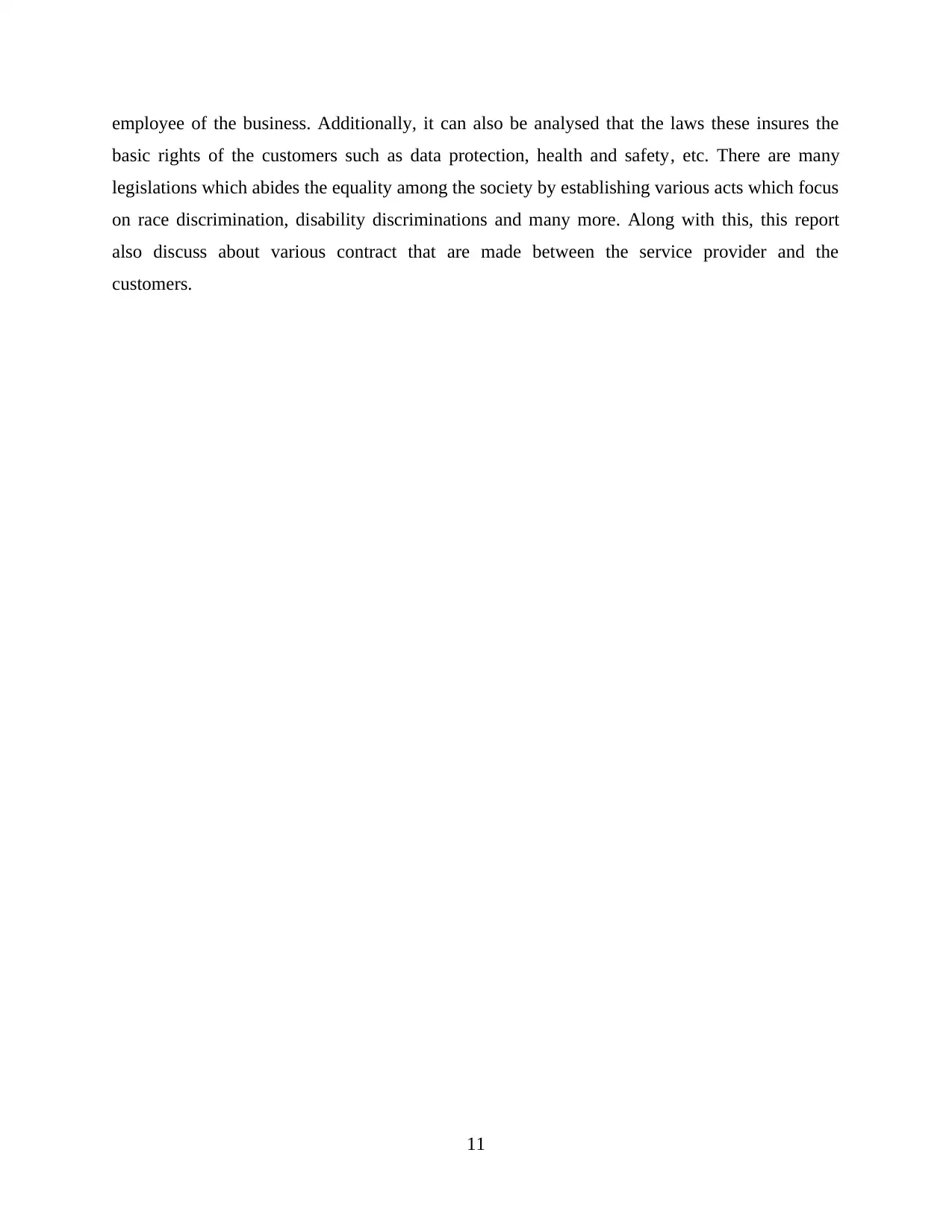
employee of the business. Additionally, it can also be analysed that the laws these insures the
basic rights of the customers such as data protection, health and safety, etc. There are many
legislations which abides the equality among the society by establishing various acts which focus
on race discrimination, disability discriminations and many more. Along with this, this report
also discuss about various contract that are made between the service provider and the
customers.
11
basic rights of the customers such as data protection, health and safety, etc. There are many
legislations which abides the equality among the society by establishing various acts which focus
on race discrimination, disability discriminations and many more. Along with this, this report
also discuss about various contract that are made between the service provider and the
customers.
11
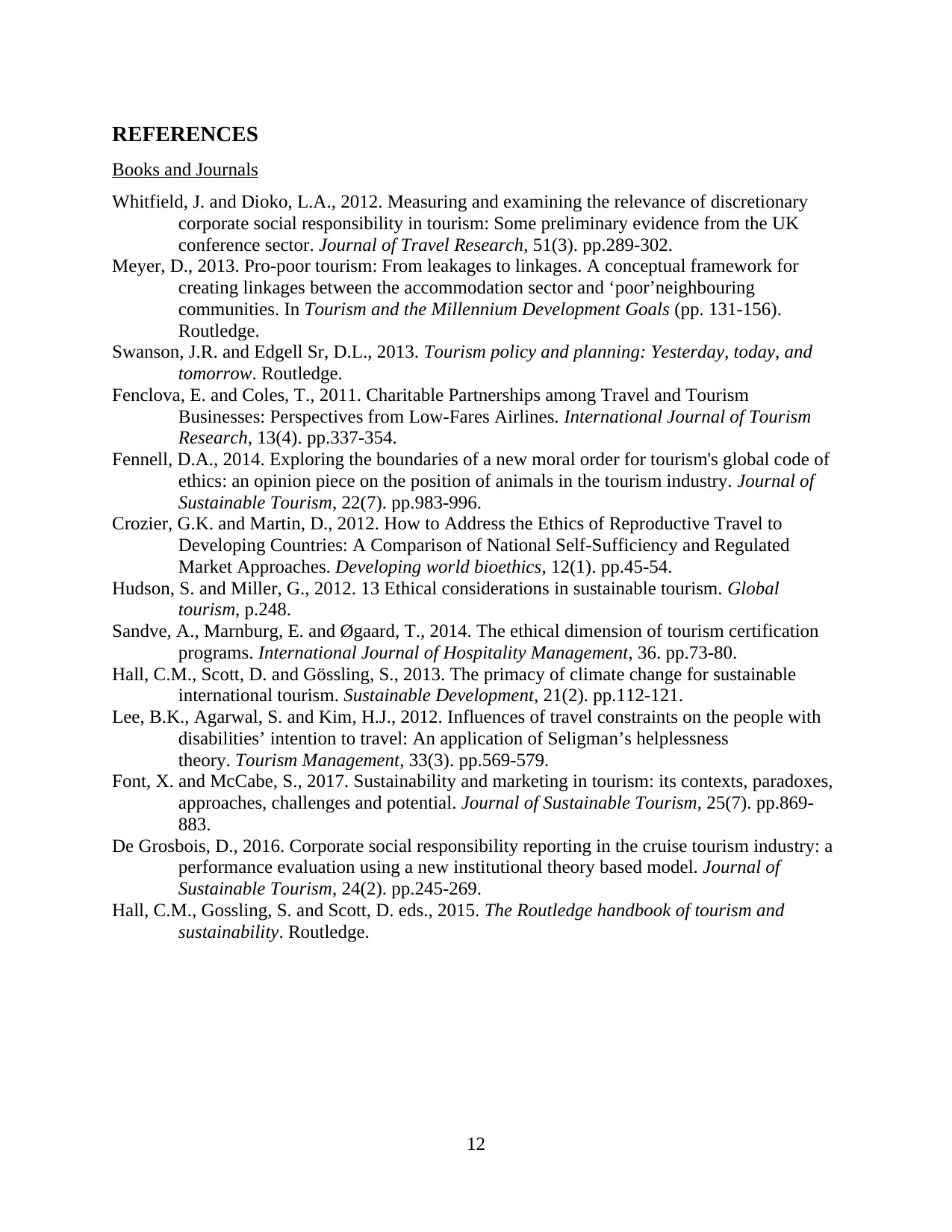
REFERENCES
Books and Journals
Whitfield, J. and Dioko, L.A., 2012. Measuring and examining the relevance of discretionary
corporate social responsibility in tourism: Some preliminary evidence from the UK
conference sector. Journal of Travel Research, 51(3). pp.289-302.
Meyer, D., 2013. Pro-poor tourism: From leakages to linkages. A conceptual framework for
creating linkages between the accommodation sector and ‘poor’neighbouring
communities. In Tourism and the Millennium Development Goals (pp. 131-156).
Routledge.
Swanson, J.R. and Edgell Sr, D.L., 2013. Tourism policy and planning: Yesterday, today, and
tomorrow. Routledge.
Fenclova, E. and Coles, T., 2011. Charitable Partnerships among Travel and Tourism
Businesses: Perspectives from Low‐Fares Airlines. International Journal of Tourism
Research, 13(4). pp.337-354.
Fennell, D.A., 2014. Exploring the boundaries of a new moral order for tourism's global code of
ethics: an opinion piece on the position of animals in the tourism industry. Journal of
Sustainable Tourism, 22(7). pp.983-996.
Crozier, G.K. and Martin, D., 2012. How to Address the Ethics of Reproductive Travel to
Developing Countries: A Comparison of National Self‐Sufficiency and Regulated
Market Approaches. Developing world bioethics, 12(1). pp.45-54.
Hudson, S. and Miller, G., 2012. 13 Ethical considerations in sustainable tourism. Global
tourism, p.248.
Sandve, A., Marnburg, E. and Øgaard, T., 2014. The ethical dimension of tourism certification
programs. International Journal of Hospitality Management, 36. pp.73-80.
Hall, C.M., Scott, D. and Gössling, S., 2013. The primacy of climate change for sustainable
international tourism. Sustainable Development, 21(2). pp.112-121.
Lee, B.K., Agarwal, S. and Kim, H.J., 2012. Influences of travel constraints on the people with
disabilities’ intention to travel: An application of Seligman’s helplessness
theory. Tourism Management, 33(3). pp.569-579.
Font, X. and McCabe, S., 2017. Sustainability and marketing in tourism: its contexts, paradoxes,
approaches, challenges and potential. Journal of Sustainable Tourism, 25(7). pp.869-
883.
De Grosbois, D., 2016. Corporate social responsibility reporting in the cruise tourism industry: a
performance evaluation using a new institutional theory based model. Journal of
Sustainable Tourism, 24(2). pp.245-269.
Hall, C.M., Gossling, S. and Scott, D. eds., 2015. The Routledge handbook of tourism and
sustainability. Routledge.
12
Books and Journals
Whitfield, J. and Dioko, L.A., 2012. Measuring and examining the relevance of discretionary
corporate social responsibility in tourism: Some preliminary evidence from the UK
conference sector. Journal of Travel Research, 51(3). pp.289-302.
Meyer, D., 2013. Pro-poor tourism: From leakages to linkages. A conceptual framework for
creating linkages between the accommodation sector and ‘poor’neighbouring
communities. In Tourism and the Millennium Development Goals (pp. 131-156).
Routledge.
Swanson, J.R. and Edgell Sr, D.L., 2013. Tourism policy and planning: Yesterday, today, and
tomorrow. Routledge.
Fenclova, E. and Coles, T., 2011. Charitable Partnerships among Travel and Tourism
Businesses: Perspectives from Low‐Fares Airlines. International Journal of Tourism
Research, 13(4). pp.337-354.
Fennell, D.A., 2014. Exploring the boundaries of a new moral order for tourism's global code of
ethics: an opinion piece on the position of animals in the tourism industry. Journal of
Sustainable Tourism, 22(7). pp.983-996.
Crozier, G.K. and Martin, D., 2012. How to Address the Ethics of Reproductive Travel to
Developing Countries: A Comparison of National Self‐Sufficiency and Regulated
Market Approaches. Developing world bioethics, 12(1). pp.45-54.
Hudson, S. and Miller, G., 2012. 13 Ethical considerations in sustainable tourism. Global
tourism, p.248.
Sandve, A., Marnburg, E. and Øgaard, T., 2014. The ethical dimension of tourism certification
programs. International Journal of Hospitality Management, 36. pp.73-80.
Hall, C.M., Scott, D. and Gössling, S., 2013. The primacy of climate change for sustainable
international tourism. Sustainable Development, 21(2). pp.112-121.
Lee, B.K., Agarwal, S. and Kim, H.J., 2012. Influences of travel constraints on the people with
disabilities’ intention to travel: An application of Seligman’s helplessness
theory. Tourism Management, 33(3). pp.569-579.
Font, X. and McCabe, S., 2017. Sustainability and marketing in tourism: its contexts, paradoxes,
approaches, challenges and potential. Journal of Sustainable Tourism, 25(7). pp.869-
883.
De Grosbois, D., 2016. Corporate social responsibility reporting in the cruise tourism industry: a
performance evaluation using a new institutional theory based model. Journal of
Sustainable Tourism, 24(2). pp.245-269.
Hall, C.M., Gossling, S. and Scott, D. eds., 2015. The Routledge handbook of tourism and
sustainability. Routledge.
12
⊘ This is a preview!⊘
Do you want full access?
Subscribe today to unlock all pages.

Trusted by 1+ million students worldwide
1 out of 12
Related Documents
Your All-in-One AI-Powered Toolkit for Academic Success.
+13062052269
info@desklib.com
Available 24*7 on WhatsApp / Email
![[object Object]](/_next/static/media/star-bottom.7253800d.svg)
Unlock your academic potential
Copyright © 2020–2025 A2Z Services. All Rights Reserved. Developed and managed by ZUCOL.




